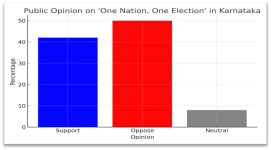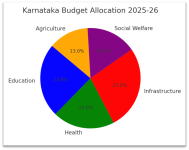Karnataka's political landscape in 2025 is driven by electoral trends, policy disputes, and regional issues. The state is transitioning to a two-party system while dealing with policy challenges like as the 'One Nation, One Election' initiative, economic reforms, and parliamentary constituency redistricting.
1. Election Trends: The Emergence of a Bipolar System
During the 2023 Karnataka Assembly elections:
· The BJP retained 65 seats (35.9% vote share).
· JD(S) witnessed a dip, winning 19 seats (13.31% vote share).
2. The ‘One Nation, One Election’ Debate
· The plan to hold simultaneous elections for the Parliament and State Assemblies has aroused debate.
· Chief Minister Siddaramaiah has opposed it, citing concerns about federalism.
· Karnataka may adopt a resolution condemning the idea.
Chart: Public Opinion on ‘One Nation, One Election’ in Karnataka

3. Controversies in Karnataka’s 2025-26 Budget
· The Karnataka budget drew criticism, mainly regarding:
· 4% reserved for Muslims in government contracts.
· Financial Assistance for Muslim Marriages
Graph: Karnataka Budget Allocation 2025-26 (Sector-wise)
4. Parliamentary Seat Delimitation Concerns
· The proposed redrawing of Lok Sabha constituencies based on the 2021 Census has sparked tension in Karnataka.
· South Indian states fear a decline in parliamentary representation.
5. Economic and Industrial Policy Developments
· Karnataka is providing tax breaks and incentives for hybrid automobiles and electric vehicles (EVs).
· By 2029, the state hopes to have doubled the number of Global Capability Centers (GCCs) from 500 to 1,000, creating 350,000 new jobs.
6. Conclusion
The political environment of Karnataka in 2025 remains dynamic, with important themes including:
· The establishment of a bipolar political structure between the INC and the BJP.
· The discussion of 'One Nation, One Election' and federalism concerns.
· The 2025-26 budget disagreement concerning social welfare policy.
· The effects of seat delimitation on Karnataka's representation.
· Economic growth initiatives, particularly in the electric vehicle and information technology sectors.
· Political, economic, and social variables will continue to determine Karnataka's governance.
Hence, we can say Karnataka’s political landscape in 2025 is marked by intense competition between the Congress and BJP, with JD(S) losing influence. Key issues shaping the state's politics include the debate on 'One Nation, One Election,' budget controversies, and concerns over seat delimitation. While economic policies focus on EV incentives and IT expansion, political challenges like federalism and regional representation remain contentious. The state's governance will depend on balancing economic growth with social policies while navigating national political shifts. Karnataka’s evolving political and economic scenario will significantly impact its future trajectory, making 2025 a crucial year for policy and governance decisions.

1. Election Trends: The Emergence of a Bipolar System
During the 2023 Karnataka Assembly elections:
· Congress (INC) won 136 seats (42.9% vote share).· The BJP retained 65 seats (35.9% vote share).
· JD(S) witnessed a dip, winning 19 seats (13.31% vote share).
|
2. The ‘One Nation, One Election’ Debate
· The plan to hold simultaneous elections for the Parliament and State Assemblies has aroused debate.
· Chief Minister Siddaramaiah has opposed it, citing concerns about federalism.
· Karnataka may adopt a resolution condemning the idea.
Chart: Public Opinion on ‘One Nation, One Election’ in Karnataka
Opinion | Percentage |
Support | 42% |
Oppose | 50% |
Neutral | 8% |
3. Controversies in Karnataka’s 2025-26 Budget
· The Karnataka budget drew criticism, mainly regarding:
· 4% reserved for Muslims in government contracts.
· Financial Assistance for Muslim Marriages
Sector | Allocation (₹ Crore) |
Education | 22,000 |
Health | 18,500 |
Infrastructure | 25,000 |
Social Welfare | 15,000 |
Agriculture | 12,000 |
Graph: Karnataka Budget Allocation 2025-26 (Sector-wise)
4. Parliamentary Seat Delimitation Concerns
· The proposed redrawing of Lok Sabha constituencies based on the 2021 Census has sparked tension in Karnataka.
· South Indian states fear a decline in parliamentary representation.
Table: Karnataka’s Lok Sabha Seat Projection After Delimitation
Year | Karnataka Lok Sabha Seats | % of Total Indian Seats |
2019 | 28 | 5.1% |
2025 (Projected) | 25 | 4.5% |
5. Economic and Industrial Policy Developments
· Karnataka is providing tax breaks and incentives for hybrid automobiles and electric vehicles (EVs).
· By 2029, the state hopes to have doubled the number of Global Capability Centers (GCCs) from 500 to 1,000, creating 350,000 new jobs.
6. Conclusion
The political environment of Karnataka in 2025 remains dynamic, with important themes including:
· The establishment of a bipolar political structure between the INC and the BJP.
· The discussion of 'One Nation, One Election' and federalism concerns.
· The 2025-26 budget disagreement concerning social welfare policy.
· The effects of seat delimitation on Karnataka's representation.
· Economic growth initiatives, particularly in the electric vehicle and information technology sectors.
· Political, economic, and social variables will continue to determine Karnataka's governance.
Hence, we can say Karnataka’s political landscape in 2025 is marked by intense competition between the Congress and BJP, with JD(S) losing influence. Key issues shaping the state's politics include the debate on 'One Nation, One Election,' budget controversies, and concerns over seat delimitation. While economic policies focus on EV incentives and IT expansion, political challenges like federalism and regional representation remain contentious. The state's governance will depend on balancing economic growth with social policies while navigating national political shifts. Karnataka’s evolving political and economic scenario will significantly impact its future trajectory, making 2025 a crucial year for policy and governance decisions.


